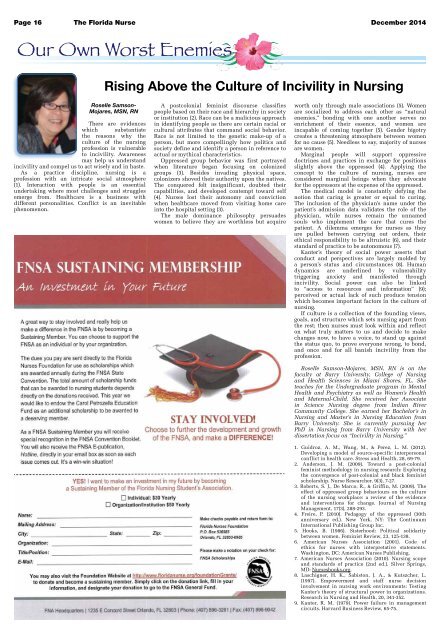The Florida Nurse - December 2014
You also want an ePaper? Increase the reach of your titles
YUMPU automatically turns print PDFs into web optimized ePapers that Google loves.
Page 16 <strong>The</strong> <strong>Florida</strong> <strong>Nurse</strong> <strong>December</strong> <strong>2014</strong><br />
Rising Above the Culture of Incivility in Nursing<br />
Roselle Samson-<br />
Mojares, MSN, RN<br />
<strong>The</strong>re are evidences<br />
which substantiate<br />
the reasons why the<br />
culture of the nursing<br />
profession is vulnerable<br />
to incivility. Awareness<br />
may help us understand<br />
incivility and compel us to act wisely and in haste.<br />
As a practice discipline, nursing is a<br />
profession with an intricate social atmosphere<br />
(1). Interaction with people is an essential<br />
undertaking where most challenges and struggles<br />
emerge from. Healthcare is a business with<br />
different personalities. Conflict is an inevitable<br />
phenomenon.<br />
A postcolonial feminist discourse classifies<br />
people based on their race and hierarchy in society<br />
or institution (2). Race can be a malicious approach<br />
in identifying people as there are certain racial or<br />
cultural attributes that command social behavior.<br />
Race is not limited to the genetic make-up of a<br />
person, but more compellingly how politics and<br />
society define and identify a person in reference to<br />
actual or mythical characteristics.<br />
Oppressed group behavior was first portrayed<br />
when literature began focusing on colonized<br />
groups (3). Besides invading physical space,<br />
colonizers shoved their authority upon the natives.<br />
<strong>The</strong> conquered felt insignificant, doubted their<br />
capabilities, and developed contempt toward self<br />
(4). <strong>Nurse</strong>s lost their autonomy and conviction<br />
when healthcare moved from visiting home care<br />
into the hospital setting (3).<br />
<strong>The</strong> male dominance philosophy persuades<br />
women to believe they are worthless but acquire<br />
worth only through male associations (5). Women<br />
are socialized to address each other as “natural<br />
enemies,” bonding with one another serves no<br />
enrichment of their essence, and women are<br />
incapable of coming together (5). Gender bigotry<br />
creates a threatening atmosphere between women<br />
for no cause (5). Needless to say, majority of nurses<br />
are women.<br />
Marginal people will support oppressive<br />
doctrines and practices in exchange for positions<br />
slightly above the oppressed (4). Applying the<br />
concept to the culture of nursing, nurses are<br />
considered marginal beings when they advocate<br />
for the oppressors at the expense of the oppressed.<br />
<strong>The</strong> medical model is constantly defying the<br />
notion that caring is greater or equal to curing.<br />
<strong>The</strong> inclusion of the physician’s name under the<br />
patient’s admission data validates the role of the<br />
physician, while nurses remain the unnamed<br />
souls who implement the care that cures the<br />
patient. A dilemma emerges for nurses as they<br />
are pulled between carrying out orders, their<br />
ethical responsibility to be altruistic (6), and their<br />
standard of practice to be autonomous (7).<br />
Kanter’s theory of social power asserts that<br />
conduct and perspectives are largely molded by<br />
a person’s status and circumstances (8). Human<br />
dynamics are underlined by vulnerability<br />
triggering anxiety and manifested through<br />
incivility. Social power can also be linked<br />
to “access to resources and information” (9);<br />
perceived or actual lack of such produce tension<br />
which becomes important factors in the culture of<br />
nursing.<br />
If culture is a collection of the founding views,<br />
goals, and structure which sets nursing apart from<br />
the rest; then nurses must look within and reflect<br />
on what truly matters to us and decide to make<br />
changes now, to have a voice, to stand up against<br />
the status quo, to prove everyone wrong, to bond,<br />
and once and for all banish incivility from the<br />
profession.<br />
Roselle Samson-Mojares, MSN, RN is on the<br />
faculty at Barry University, College of Nursing<br />
and Health Sciences in Miami Shores, FL. She<br />
teaches for the Undergraduate program in Mental<br />
Health and Psychiatry as well as Women’s Health<br />
and Maternal-Child. She received her Associate<br />
in Science Nursing degree from Indian River<br />
Community College. She earned her Bachelor’s in<br />
Nursing and Master’s in Nursing Education from<br />
Barry University. She is currently pursuing her<br />
PhD in Nursing from Barry University with her<br />
dissertation focus on “Incivility in Nursing.”<br />
1. Guidroz, A. M., Wang, M., & Perez, L. M. (2012).<br />
Developing a model of source-specific interpersonal<br />
conflict in health care. Stress and Health, 28, 69-79.<br />
2. Anderson, J. M. (2009). Toward a post-colonial<br />
feminist methodology in nursing research: Exploring<br />
the convergence of post-colonial and black feminist<br />
scholarship. <strong>Nurse</strong> Researcher, 9(3), 7-27.<br />
3. Roberts, S. J., De Marco, R., & Griffin, M. (2009). <strong>The</strong><br />
effect of oppressed group behaviours on the culture<br />
of the nursing workplace: a review of the evidence<br />
and interventions for change. Journal of Nursing<br />
Management, 17(3), 288-293.<br />
4. Freire, P. (2010). Pedagogy of the oppressed (30th<br />
anniversary ed.). New York, NY: <strong>The</strong> Continuum<br />
International Publishing Group Inc.<br />
5. Hooks, B. (1986). Sisterhood: Political solidarity<br />
between women. Feminist Review, 23, 125-138.<br />
6. American <strong>Nurse</strong>s Association (2001). Code of<br />
ethics for nurses with interpretative statements.<br />
Washington, DC: American <strong>Nurse</strong>s Publishing.<br />
7. American <strong>Nurse</strong>s Association (2010). Nursing scope<br />
and standards of practice (2nd ed.). Silver Springs,<br />
MD: <strong>Nurse</strong>sbooks.org.<br />
8. Laschigner, H. K., Sabiston, J. A., & Kutszcher, L.<br />
(1997). Empowerment and staff nurse decision<br />
involvement in nursing work environments: Testing<br />
Kanter’s theory of structural power in organizations.<br />
Research in Nursing and Health, 20, 341-352.<br />
9. Kanter, R. M. (1979). Power failure in management<br />
circuits. Harvard Business Review, 65-75.

















